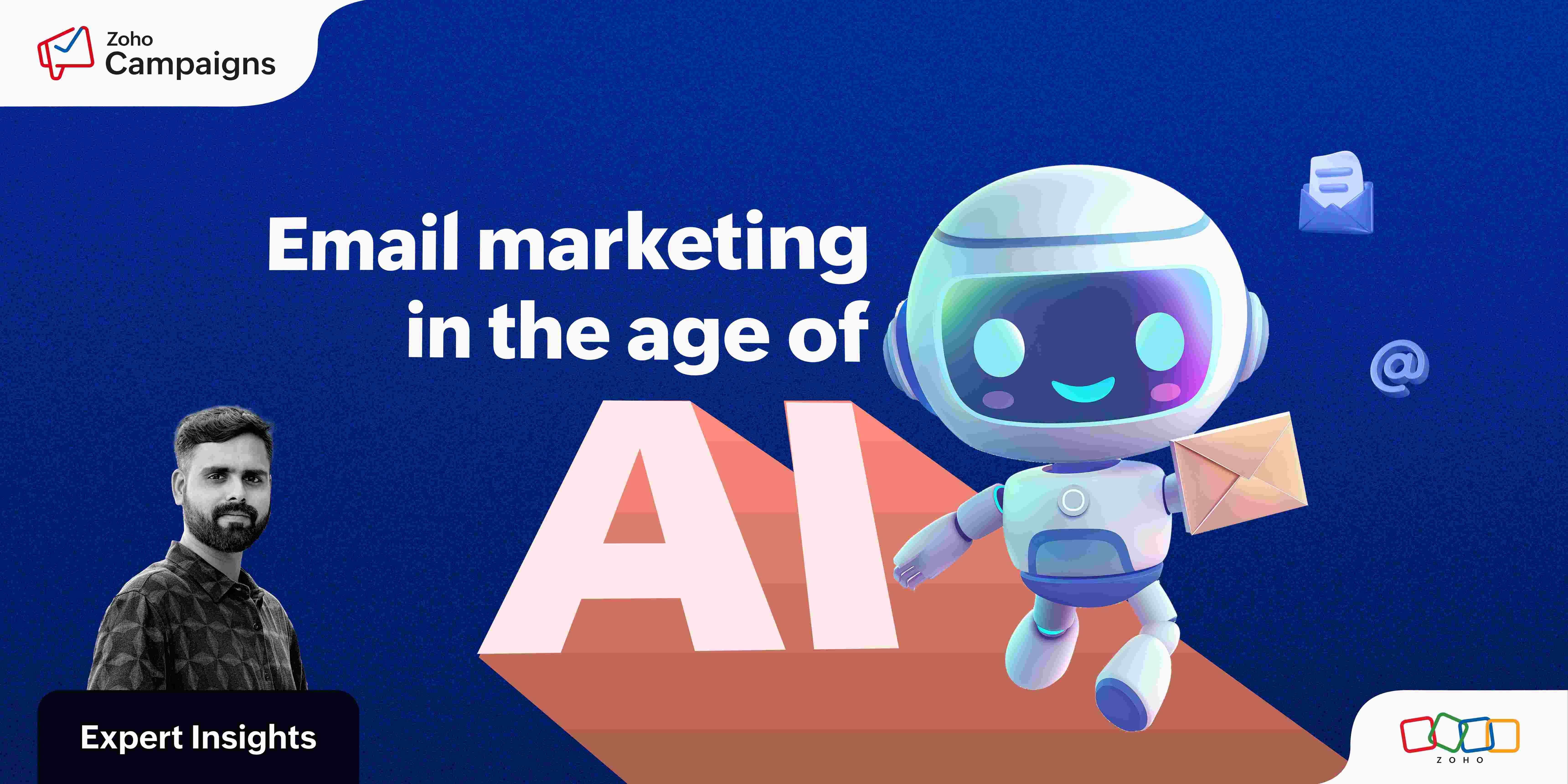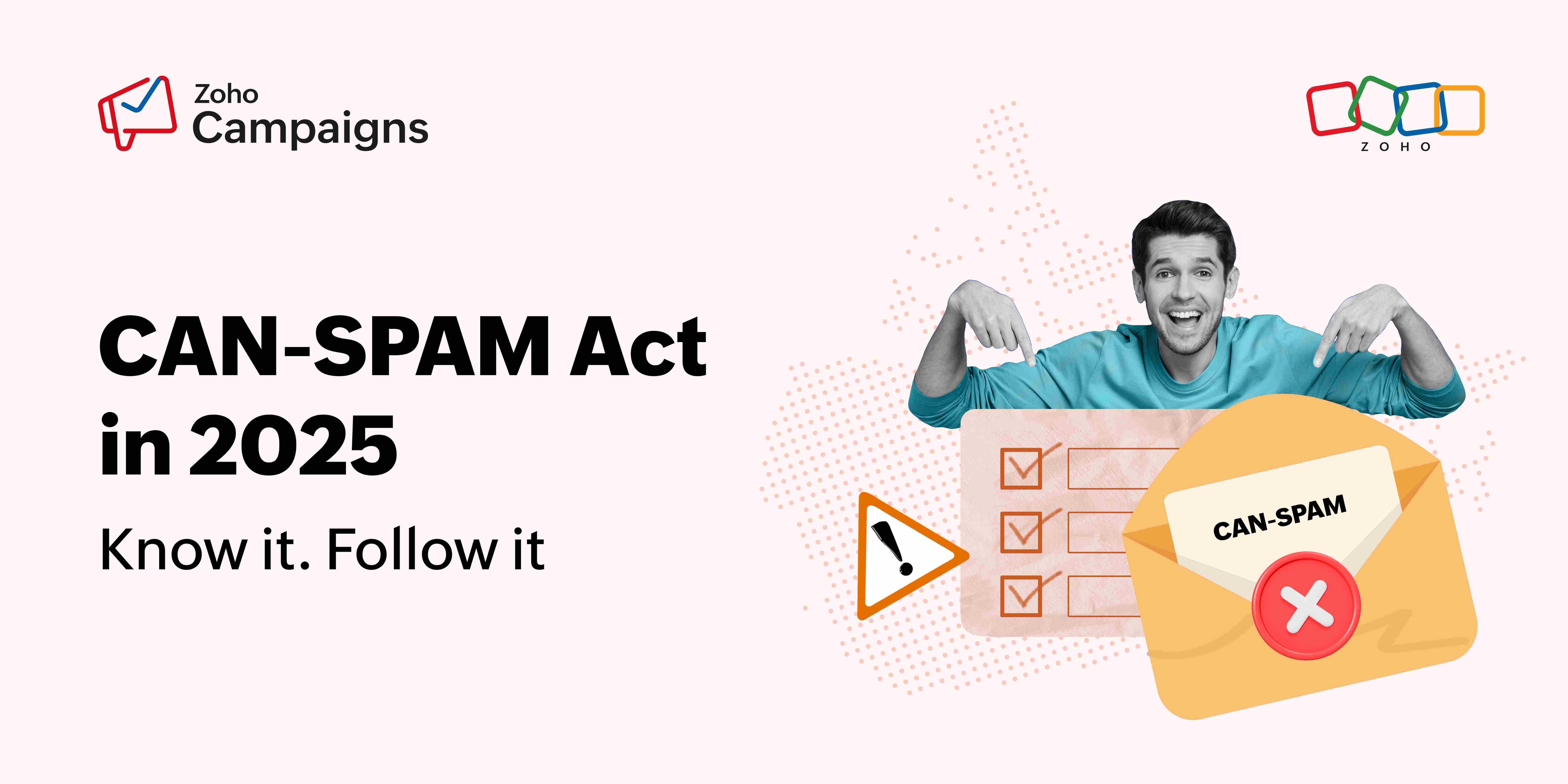- HOME
- Email Marketing
- Email Marketing in the Age of AI
Email Marketing in the Age of AI
- Last Updated : May 15, 2025
- 5 Views
- 5 Min Read

I'll say it upfront: I was once skeptical about AI. My skepticism stemmed from my belief that conversations about AI in business were largely a fad; I thought AI was just another buzzword everyone was throwing around—especially marketers—to sound cool in conferences. But the more I read about, discussed, and explored AI, the more I realized that it was going to be transformative—on par with fire, the wheel, electricity, the transistor, computers, and the internet.
While there are debates about AI and its role, I think artificial intelligence in email marketing is a force for good. I'm not being overly enthusiastic in my assertions because, in my view, AI has already positively impacted email marketers and customers alike. Stick with me till the end to understand how.
First things first: What is AI in email marketing?
AI in email marketing refers to the use of artificial intelligence technologies—like machine learning (ML), natural language processing (NLP), predictive analytics, and others—to automate, personalize, and optimize email campaigns and, in turn, to enhance customer engagement and boost sales.
How is AI-driven email marketing different from traditional email marketing?
AI-driven email marketing leverages AI technologies like ML and NLP. While traditional email marketing relies on fixed patterns and schedules, AI-driven email marketing is more intelligent and dynamic, powered by various algorithms. As an AI system receives more and more data related to customer interactions and behaviors, it "adapts" and becomes more "intelligent."
Let's look at three AI algorithms relevant to email marketing to drive the point home.
Logistic regression
Description: A statistical model used for binary classification tasks, such as predicting whether a user will open an email or not.
Use case: Estimating the probability that a recipient will click on a specific email link and thereby aiding targeted campaign strategies.
Decision trees
Description: A flowchart-like model that splits data into branches to make predictions based on feature values.
Use case: Segmenting email subscribers based on engagement metrics to tailor content accordingly.
Random forests
Description: An ensemble learning method that constructs multiple decision trees and merges their results for more accurate predictions.
Use case: Predicting customer lifetime value to identify and focus on high-value subscribers.
In my view, AI in email marketing is causing a fundamental shift in how marketers engage with customers, enabling them to present their audiences with highly relevant and timely messages that result in better open rates, more conversions, and higher overall customer satisfaction—all without increasing manual effort. You might wonder, how exactly? And that's what the next section is about.
Benefits for email marketers
What's important is whether a technology improves efficiency and delivers value to all the stakeholders involved (businesses, customers, etc). In my view, AI offers benefits to both marketers and customers alike by enhancing workflows for businesses while creating more relevant, personalized experiences for customers.
Enhanced customer segmentation
Traditional ways of segmenting customer data involve categorizing customers based on static parameters like age, country, or location. AI enables marketers to segment customers based on dynamic data like behaviors, purchase frequency, time spent on-site, and so on. These allow for more targeted and effective email campaigns, leading to higher engagement rates and improved returns on investment.
Predicting customer lifetime value
Not every customer has equal value to a business. Understanding a customer's long-term value enables marketers to plan campaigns strategically. AI facilitates the prediction of customer lifetime value by analyzing historical data and identifying patterns that indicate future purchasing behaviors. This insight can help marketers tailor their marketing efforts to high-value customers.
Optimized send times
Unlike shooting out emails based on preset schedules, determining the optimal time to send emails can significantly impact open and click-through rates—which is exactly what AI algorithms can help with. They analyze past engagement data to predict the best times to reach individual recipients and thereby increase the likelihood of engagement.
Automated content creation
AI-powered tools can generate and optimize email content, including subject lines and body text, and tailor it to the preferences of different customer segments.This automation not only saves time but also ensures consistency and relevance in messaging. The entire globe is doing this already.
Sentiment analysis
AI can help with sentiment analysis, which is the process of detecting the tone or emotion of written content. Email marketers can use sentiment analysis to evaluate customer responses to their post-purchase emails. For instance, when a customer expresses frustration (e.g., “package is damaged”) marketers can
add them to the “recovery” segment (because a frustrated customer might churn) and run targeted campaigns.
Benefits for customers
Personalized content
AI enables the delivery of personalized email content that resonates with individual preferences and behaviors. By analyzing data such as past purchases and browsing history, AI helps create emails that are relevant and engaging and enhance the overall customer experience.
Relevant product recommendations
Through predictive analytics, AI can suggest products or services that align with a customer's interests and needs. These tailored recommendations make marketing emails more useful and can lead to increased customer satisfaction and loyalty.
Reduced email fatigue
AI helps prevent email fatigue by optimizing the frequency and timing of communications. By understanding individual engagement patterns, AI ensures that customers receive emails at intervals that are neither too frequent nor too sparse, and thus maintain their interest without causing annoyance.
Enhanced customer support
AI-driven chatbots and virtual assistants can be integrated into email platforms to provide immediate assistance and answer questions. These integrations enhance the customer experience by offering timely support directly through email interactions.
Ethical email marketing in the age of AI: The elephant in the inbox
As AI becomes more "intelligent," I believe it's important for marketers to strike a balance between leveraging AI to enhance the customer experience and protecting user privacy. The more sophisticated an AI model becomes, the more user data it needs—and that dynamic raises questions about privacy, consent, and how much data is too much.
Privacy concerns: One of the key concerns with using AI in communication is the potential breach of user privacy due to the analysis of email content and associated metadata. Even in the age of AI, email marketers need to stick to the basics. Implementing double opt-ins and being transparent about how the customer data is used can allay fears and foster trust.
Security concerns: With over 90% of cyberattacks beginning with
phishing campaigns, email systems can be vulnerable to security breaches. AI algorithms may inadvertently propagate this type of malware. Therefore, email service providers should implement advanced threat detection systems and actively educate users on common phishing techniques to reduce the risk and impact of security breaches.
Where this is all headed
AI is here to stay and will become increasingly central to how email campaigns are strategized and executed. I think we, as email marketers, must adapt to this new reality or vanish into oblivion. Looking ahead, AI is going to make email marketing less about sending emails and more about designing personalized customer experiences.
Do I think AI will replace marketers? Not at all. A lot of marketing still requires application of human thought and judgment. However, AI enables marketers to make better decisions. The grunt work? Automated. Analysis? Sharpened. The creativity? Amplified. Tailored customer experiences? Simplified.



